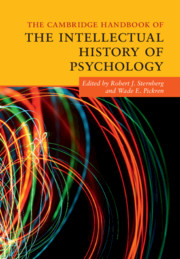Book contents
- The Cambridge Handbook of the Intellectual History of Psychology
- The Cambridge Handbook of the Intellectual History of Psychology
- Copyright page
- Contents
- Figures
- Tables
- Contributors
- Introduction
- 1 Major Paradigms and Approaches in Psychology
- 2 Methodology in Psychology
- 3 Neuroscience in Psychology
- 4 Sensation and Perception
- 5 Attention: Awareness and Control
- 6 Learning
- 7 Memory
- 8 Decision-Making
- 9 Creativity
- 10 Intelligence
- 11 Development
- 12 Social Psychology
- 13 Gender
- 14 Emotion
- 15 Motivation
- 16 Personality
- 17 Abnormal Psychology
- 18 Psychotherapy
- 19 Health Psychology
- Index
- References
2 - Methodology in Psychology
Published online by Cambridge University Press: 18 May 2019
- The Cambridge Handbook of the Intellectual History of Psychology
- The Cambridge Handbook of the Intellectual History of Psychology
- Copyright page
- Contents
- Figures
- Tables
- Contributors
- Introduction
- 1 Major Paradigms and Approaches in Psychology
- 2 Methodology in Psychology
- 3 Neuroscience in Psychology
- 4 Sensation and Perception
- 5 Attention: Awareness and Control
- 6 Learning
- 7 Memory
- 8 Decision-Making
- 9 Creativity
- 10 Intelligence
- 11 Development
- 12 Social Psychology
- 13 Gender
- 14 Emotion
- 15 Motivation
- 16 Personality
- 17 Abnormal Psychology
- 18 Psychotherapy
- 19 Health Psychology
- Index
- References
Summary
Psychology, perhaps more than any other social science, has historically defined itself by the methodologies it employs in generating new knowledge. This chapter surveys the history of methodology in psychology. We begin by first defining the concept of a methodology, then survey early scientific methods of psychology with the work of Gustav Fechner in the 1860s. Fechner, along with other psychophycisists of the time, were of the first to promote a rigorous scientific method in the study and understanding of psychological phenomena. The quest for quantification in psychology would continue with the work of Francis Galton and his monumental discovery of empirical correlation almost thirty years later, which set the stage for a wealth of statistical methodologies that would arise in the early twentieth century. These included the birth of psychometrics and testing, as well as the development of the factor analysis method used by Charles Spearman and others. By the early 1920s, geneticist R. A. Fisher revolutioned the application of quantitative methods by promoting null hypothesis significance testing, while simultaneously packaging experimental design into the method of the analysis of variance. We close the chapter with a survey of Sewall Wright’s method of path analysis, which, along with factor analysis (and the advancement of the computer), set the stage for the birth of structural equation models of the mid-to-late twentieth century. While psychological science has been dominated by quantitative methods, the reemergence of qualitative methods is also noteworthy. We conclude with a comment that psychological methods of the future, to be successful, will likely require a merger of both quantitative and qualitative approaches.
Keywords
- Type
- Chapter
- Information
- Publisher: Cambridge University PressPrint publication year: 2019
References
- 1
- Cited by

